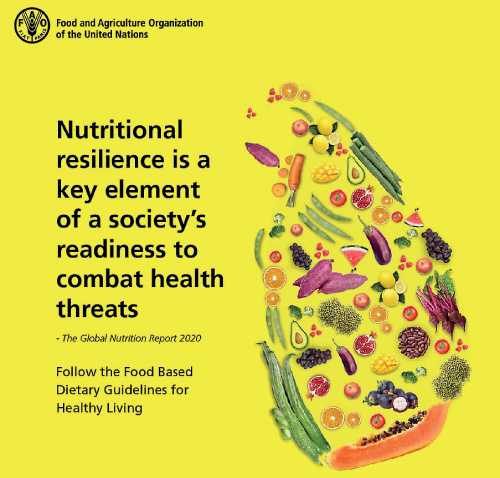Monday Feb 23, 2026
Monday Feb 23, 2026
Wednesday, 14 October 2020 00:31 - - {{hitsCtrl.values.hits}}
 The Food Based Dietary Guidelines (FBDGs) form the single most powerful tool and equal platform to improve nutrition in the country. If these guidelines are disseminated effectively among the general public, as they are food based and easy to understand, the fundamentals of good nutrition can be met.
The Food Based Dietary Guidelines (FBDGs) form the single most powerful tool and equal platform to improve nutrition in the country. If these guidelines are disseminated effectively among the general public, as they are food based and easy to understand, the fundamentals of good nutrition can be met.
Sri Lanka’s FBDGs can also be the basis of equitable food consumption as they talk about suitable combinations and quantities for all. These can ensure that under or over consumption is avoided.
Over 100 countries around the world have developed Food Based Dietary Guidelines (FBDGs) and graphically explicit symbolic “food guides”, that accompany these FBDGs. Few of these countries have tracked the intermediate outcomes and to some degree identified the effectiveness of certain messages and guidelines on food related behavior changes.
The Global Nutrition Report 2020 has this to say especially in the face of COVID 19: “The Global Nutrition Report sheds light on where progress has been made and where challenges remain. New analysis shows that global and national patterns hide significant inequalities within countries and populations, with the most vulnerable groups being most affected. Although the 2020 Global Nutrition Report was written before the current coronavirus pandemic, its emphasis on nutritional well-being for all, particularly the most vulnerable, has a heightened significance in the face of this new global threat. The need for more equitable, resilient and sustainable food and health systems has never been more urgent. Good nutrition is an essential part of an individual’s defense against COVID-19. Nutritional resilience is a key element of a society’s readiness to combat the threat. Focusing on nutritional well-being provides opportunities for establishing synergies between public health and equity, in line with the 2030 Agenda for Sustainable Development.”
How country specific FBDGs are derived
Integrated evidence from technical reviews, field findings and Diet (Food) Modeling produce technical recommendations that inform the formulation of the FBDGs and its simplified messages to be used in different settings by various practitioners.
The three areas of research examines gaps in nutrient requirements for different age/gender groups at varying levels of physical activity and life cycle stages. This reflects culturally owned dietary patterns within various socio-economic groups, taking into account food consumption behavior, food supply, food availability, accessibility, affordability as well as sustainability. In addition, health related risk factors associated with nutrition and diet issues are also studied.
It assesses the food environment in different settings while current policy gaps, strategies and programs in relation to health and wellbeing of the population are scrutinised. The findings form the basis for technical recommendations in improving food choices for better health, through the FBDGs.
Country specific Food-Based Dietary Guidelines (FBDGs) for the masses are one of the FAO/WHO recommended tools to improve healthy eating habits and lifestyles of individuals and populations. FBDGs were also endorsed by countries including Sri Lanka in the Framework for Action agreed at the Second International Conference on Nutrition.
Currently the FBDGs are being revised by the Ministry of Health and partners based on the situational analysis of health and nutrition in Sri Lanka, a task supported by the Food and Agriculture Organization of the United Nations (FAO) and the Nutrition Society of Sri Lanka.